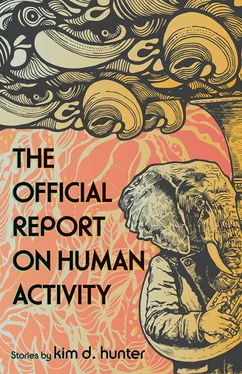“You’ve got to go easier with her, Tyrone. She doesn’t see things as… clearly as you, sometimes.”
He reached for his mother’s hand, looked to the woods where Schwartz had disappeared, and reluctantly realized he needed to talk with her.
“How do you know he doesn’t know?” Schwartz asked defensively.
“How many black people have blond hair and pale skin?”
“My lips are thick as yours and you can’t even have a fro.”
“There are white people with fros these days, in case you haven’t noticed.” He had not wanted to become agitated. He knew they were on the one subject that could take his sister over the edge. But he couldn’t stop himself and began talking emphatically with his hands.
“Most white people are not like—”
“Don’t give me that ‘mom is the exception to the rule’ crap for the umpteenth time,” she said angrily, mocking his hand movement.
“Be for real!” he shouted. “Look at the world. I didn’t make it. Did I drag people over here in chains?”
Sitting outside the cabin, she hoped no one could hear her children shouting. She was about to go inside when she heard gunfire echoing from the woods. The shots opened a chasm of fear and regret from an unclosed wound, the death of her husband.
* * *
She had met her husband, a wiry, tan-skinned, handsome man with thick glasses, at the University of Michigan bookstore a year after the bombing of Pearl Harbor. She was a cashier and he held court with a handful of other Negroes (were there more than that on campus? why had she not noticed them before?) in a lounge just beyond the checkout counter. He had tales of a bohemian weekend in New York and the politics of the new bebop jazz movement. But it was his knowledge of opera that fascinated her. That was an art of both magic and privilege, a harbor. They spent their rare leisure hours in the library’s listening room, worlds away from where they sat.
People stared, but just as many remarked that they made a beautiful couple. They managed to find a justice of the peace willing to conduct a small civil ceremony and then embarked on a visit to astonished, apprehensive, but mostly cordial relatives. Reluctantly, he agreed they would go south to visit his oldest relative.
“I’ll get to meet your great-grandmother, finally.”
“Let’s hope that’s not the operative term,” he had replied.
His great-grandmother was bedridden in rural Alabama, where marriages such as his were tantamount to attacking the local Ku Klux Klan. The now obvious pregnancy (with what turned out to be twins) did not mitigate the situation. The image she would always hold of the great-grandmother was of her eyes. When the elderly woman saw the two of them together for the first time, her eyes widened, then narrowed. There was no malice. It was as if the old woman was trying to read something barely fathomable.
On his way to the closest grocery store, miles from the house, her husband had called from a gas station to say he was having car trouble. She never heard from him again. The car was found torched. Diplomatic but insistent inquiries from the University newspaper and her husband’s doctoral committee prompted authorities to conduct a nominal investigation. Services were held without the body.
* * *
Tyrone had pushed Schwartz to the ground after the first shot. After the second blast, he was overcome and ran toward where the shots rang out. She looked up and shouted his name just as she saw someone with a rifle turn and dart through the trees. The flash of the face she saw stabbed at her heart.
He was almost out of ammo and the colored boy was coming for him, moving with the legendary swiftness he thought those people had. Would his fleeing make him seem less of a hero to her? He knew the woods. Surely, a few twist and turns would leave the black bastard in the dust. He miscalculated.
Catching a glint of sun on the gun barrel edging through the knot of a tree, Tyrone crouched and, despite his anger, almost laughed to himself. He could hear his mother telling him the story of a changeling being left in a tree, traded for a human baby.
“I got your changeling,” he thought and gritted his teeth. The ground was soft with moss. Only the occasional faint snap of a twig betrayed his movement and he left plenty of time between those sounds.
When he’d seen it was a white boy shooting, he knew it was his sister’s lover and that she would be torn by the assault. But that somehow made him all the more furious. It took him back to the process of slowly learning why his father was not around.
Their mother had carefully fed them age-appropriate bits of information until one afternoon, when it all collapsed into the ugly truth of a body burned beyond recognition. It had left the three of them with an unspeakable bond.
Tyrone managed to surprise him from behind, but not before the white man in the hollow tree pulled the gun from where it had been pointing. He tried to re-aim, but Tyrone was on him. They were bloodied in the struggle before the gun went off.
Later, Tyrone lied to his mother and sister and said he’d been outrun. They would be leaving the next morning anyway.
Months later, when the police came to their mother’s door, she told them she didn’t know where her son or daughter were. The circles beneath her eyes caused the police to pity her and suspect she was lying. She didn’t tell what little she knew, that something terrible must have happened to cause her son to leave with no explanation and for her daughter, denying pregnancy, to insist on going with him. As much as anything, their false cheerfulness had disturbed their mother’s sleep.
* * *
Schwartz and her brother were looking for a fresh start, albeit in the city of their birth, where their mother had moved in with in-laws after her husband’s murder. Though she had eventually moved them all back to Detroit because the factories paid more than the universities, Tyrone and Schwartz knew enough about DC to pretend they’d always lived there, that they had not arrived from a distance with a story.
On the long bus trip to the nation’s capital, they had argued over the question of making a living. Details eluded them. It always ended in the same place—something menial until something better came along.
The apartment they rented had once clearly been some sort of store. The door opened directly onto the sidewalk: no steps, lawn, or porch. The bathroom was tiny and the shower jerry-rigged into place. She found it functional but, though he tried to hide it, it depressed Tyrone deeply—not so much the physical place but that it had come to this, that he would be lucky to stay out of prison, to say nothing of fulfilling his dreams. Despite her misgivings about spending money they didn’t have, she agreed to go to the bar with him after they’d stored their meager belongings.
The place, a few blocks from the university, was crowded, but they managed to find a table. He went to stand in one of the lines at the bar to order. He returned to find his sister talking with a white couple at the next table. They tried to hide their surprise seeing Tyrone sit down with what they had assumed was a white woman. They were equally surprised and a bit relieved to notice the incredible resemblance between the two.
“I know how you feel,” the young man was saying to Schwartz as Tyrone sat down. “We should both be back at the dorm working on the same doggone paper.”
The woman with him, close to being drunk, almost sputtered, “It’s so stupid, though. I mean I can’t even tell my mom. She would be so pissed-off to know that I have to write about a brother and sister having sex, even if it is in an opera.”
“ Sigmund und Sieglinde ,” Schwartz piped up. “Actually, their incest is supposed to be an outrage; it’s the result of, well, it’s a long story, as I’m sure you know, but it’s not glorified or anything.”
Читать дальше












